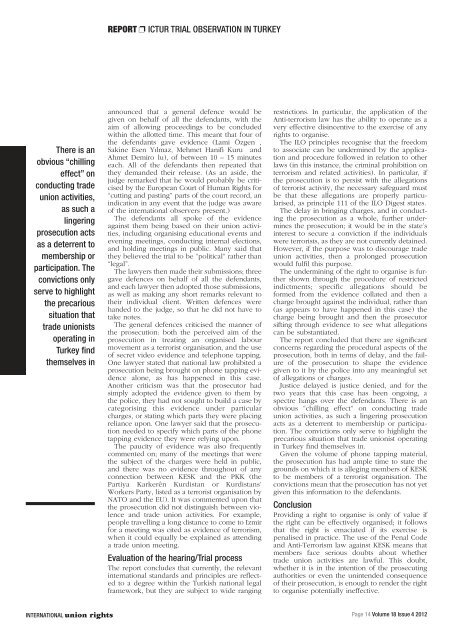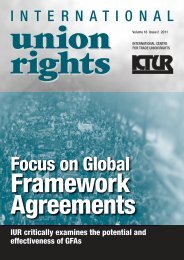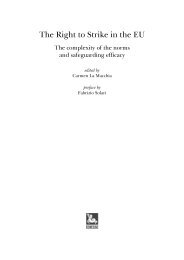International Centre for Trade Union Rights
International Centre for Trade Union Rights
International Centre for Trade Union Rights
Create successful ePaper yourself
Turn your PDF publications into a flip-book with our unique Google optimized e-Paper software.
REPORT ❐ ICTUR TRIAL OBSERVATION IN TURKEY<br />
There is an<br />
obvious “chilling<br />
effect” on<br />
conducting trade<br />
union activities,<br />
as such a<br />
lingering<br />
prosecution acts<br />
as a deterrent to<br />
membership or<br />
participation. The<br />
convictions only<br />
serve to highlight<br />
the precarious<br />
situation that<br />
trade unionists<br />
operating in<br />
Turkey find<br />
themselves in<br />
announced that a general defence would be<br />
given on behalf of all the defendants, with the<br />
aim of allowing proceedings to be concluded<br />
within the allotted time. This meant that four of<br />
the defendants gave evidence (Lami Özgen ,<br />
Sakine Esen Yılmaz, Mehmet Hanifi Kuruğ and<br />
Ahmet Demiroğlu), of between 10 – 15 minutes<br />
each. All of the defendants then repeated that<br />
they demanded their release. (As an aside, the<br />
judge remarked that he would probably be criticised<br />
by the European Court of Human <strong>Rights</strong> <strong>for</strong><br />
“cutting and pasting” parts of the court record, an<br />
indication in any event that the judge was aware<br />
of the international observers present.)<br />
The defendants all spoke of the evidence<br />
against them being based on their union activities,<br />
including organising educational events and<br />
evening meetings, conducting internal elections,<br />
and holding meetings in public. Many said that<br />
they believed the trial to be “political” rather than<br />
“legal”.<br />
The lawyers then made their submissions; three<br />
gave defences on behalf of all the defendants,<br />
and each lawyer then adopted those submissions,<br />
as well as making any short remarks relevant to<br />
their individual client. Written defences were<br />
handed to the judge, so that he did not have to<br />
take notes.<br />
The general defences criticised the manner of<br />
the prosecution: both the perceived aim of the<br />
prosecution in treating an organised labour<br />
movement as a terrorist organisation, and the use<br />
of secret video evidence and telephone tapping.<br />
One lawyer stated that national law prohibited a<br />
prosecution being brought on phone tapping evidence<br />
alone, as has happened in this case.<br />
Another criticism was that the prosecutor had<br />
simply adopted the evidence given to them by<br />
the police, they had not sought to build a case by<br />
categorising this evidence under particular<br />
charges, or stating which parts they were placing<br />
reliance upon. One lawyer said that the prosecution<br />
needed to specify which parts of the phone<br />
tapping evidence they were relying upon.<br />
The paucity of evidence was also frequently<br />
commented on; many of the meetings that were<br />
the subject of the charges were held in public,<br />
and there was no evidence throughout of any<br />
connection between KESK and the PKK (the<br />
Partiya Karkerên Kurdistan or Kurdistans’<br />
Workers Party, listed as a terrorist organisation by<br />
NATO and the EU). It was commented upon that<br />
the prosecution did not distinguish between violence<br />
and trade union activities. For example,<br />
people travelling a long distance to come to Izmir<br />
<strong>for</strong> a meeting was cited as evidence of terrorism,<br />
when it could equally be explained as attending<br />
a trade union meeting.<br />
Evaluation of the hearing/Trial process<br />
The report concludes that currently, the relevant<br />
international standards and principles are reflected<br />
to a degree within the Turkish national legal<br />
framework, but they are subject to wide ranging<br />
restrictions. In particular, the application of the<br />
Anti-terrorism law has the ability to operate as a<br />
very effective disincentive to the exercise of any<br />
rights to organise.<br />
The ILO principles recognise that the freedom<br />
to associate can be undermined by the application<br />
and procedure followed in relation to other<br />
laws (in this instance, the criminal prohibition on<br />
terrorism and related activities). In particular, if<br />
the prosecution is to persist with the allegations<br />
of terrorist activity, the necessary safeguard must<br />
be that these allegations are properly particularised,<br />
as principle 111 of the ILO Digest states.<br />
The delay in bringing charges, and in conducting<br />
the prosecution as a whole, further undermines<br />
the prosecution; it would be in the state’s<br />
interest to secure a conviction if the individuals<br />
were terrorists, as they are not currently detained.<br />
However, if the purpose was to discourage trade<br />
union activities, then a prolonged prosecution<br />
would fulfil this purpose.<br />
The undermining of the right to organise is further<br />
shown through the procedure of restricted<br />
indictments; specific allegations should be<br />
<strong>for</strong>med from the evidence collated and then a<br />
charge brought against the individual, rather than<br />
(as appears to have happened in this case) the<br />
charge being brought and then the prosecutor<br />
sifting through evidence to see what allegations<br />
can be substantiated.<br />
The report concluded that there are significant<br />
concerns regarding the procedural aspects of the<br />
prosecution, both in terms of delay, and the failure<br />
of the prosecution to shape the evidence<br />
given to it by the police into any meaningful set<br />
of allegations or charges.<br />
Justice delayed is justice denied, and <strong>for</strong> the<br />
two years that this case has been ongoing, a<br />
spectre hangs over the defendants. There is an<br />
obvious “chilling effect” on conducting trade<br />
union activities, as such a lingering prosecution<br />
acts as a deterrent to membership or participation.<br />
The convictions only serve to highlight the<br />
precarious situation that trade unionist operating<br />
in Turkey find themselves in.<br />
Given the volume of phone tapping material,<br />
the prosecution has had ample time to state the<br />
grounds on which it is alleging members of KESK<br />
to be members of a terrorist organisation. The<br />
convictions mean that the prosecution has not yet<br />
given this in<strong>for</strong>mation to the defendants.<br />
Conclusion<br />
Providing a right to organise is only of value if<br />
the right can be effectively organised; it follows<br />
that the right is emaciated if its exercise is<br />
penalised in practice. The use of the Penal Code<br />
and Anti-Terrorism law against KESK means that<br />
members face serious doubts about whether<br />
trade union activities are lawful. This doubt,<br />
whether it is in the intention of the prosecuting<br />
authorities or even the unintended consequence<br />
of their prosecution, is enough to render the right<br />
to organise potentially ineffective.<br />
INTERNATIONAL union rights Page 14 Volume 18 Issue 4 2012





